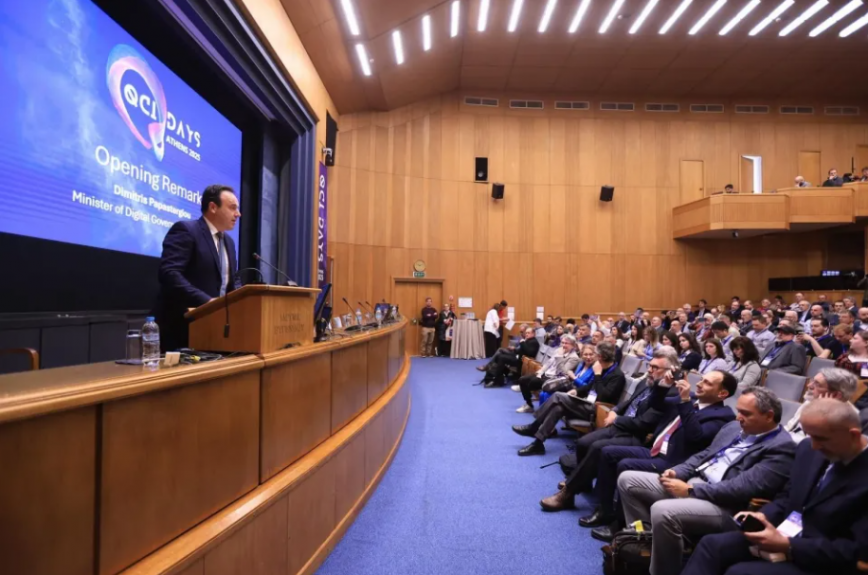Summary
As quantum computing matures, concerns about the security of digital communications and critical infrastructure intensify. In this new geopolitical and technological landscape, quantum communications emerge as the only technologically mature response to next-generation cyber threats.
Europe and Greece in particular are taking on an active role in shaping the evolving map of quantum security. The QCI Days Athens 2025 (28-30 April 2025), held at the Eugenides Foundation, showcased Greece’s high level of expertise, cross-sector collaboration, and strategic readiness, placing the country at the heart of European developments. The event was held under the auspices of the Greek Ministry of Digital Governance and with the support of the General Secretariat of Telecommunications and Post, in the context of the International Year of Quantum Science and Technology (IYQ) and World Quantum Day 2025.
Article Highlights
The growing capabilities of quantum computing have raised significant concerns across Europe about safeguarding sensitive data and critical infrastructure.
The demand for secure communications drives the shift to next-generation telecom infrastructures. Quantum communications, and particularly Quantum Key Distribution (QKD), offer the only viable solution for mitigating such threats. In this fast-growing field, Europe is emerging as a global leader, with Greece positioned among the core players of the EU.
Quantum technologies are structured around four fundamental pillars: quantum computing, quantum sensing, quantum metrology, and quantum communications. Quantum communications is the one out of the four fundamental pillars with the most mature technology that have practical applications. Based on the principles of quantum mechanics and especially QKD, this approach provides proven physical-layer security that cannot be breached. The European Union, through the EuroQCI initiative aims to build a EU-wide quantum communication network by 2030 — a step toward the future Quantum Internet.
Greece’s National Quantum Communication Infrastructure, HellasQCI, is being developed in alignment with the EuroQCI, under the coordination of GRNET, with the support of the Ministry of Digital Governance and under the guidance of the General Secretariat of Telecommunications and Post. Its goal is to enhance national cybersecurity resilience by securing sensitive data and critical infrastructure, where it is needed.
HellasQCI is a strategic priority for the Greek government. As stated by the Minister of Digital Governance, Dimitris Papastergiou, to the CNN reporter D. Mallas: “Quantum technologies are no longer abstract or distant. They are a strategic necessity for the European Union, ensuring data security, technological resilience, and autonomy. As a country, we see quantum infrastructure both as a priority and as an opportunity to invest in innovation, industry, and the upskilling of our human capital.”
HellasQCI connects Athens, Thessaloniki, and Heraklion via more than 650 km of optical fiber and three Optical Ground Stations (OGS). By investing in both terrestrial and space-based quantum technologies, Greece is taking strategic steps into the quantum era and contributing to Europe’s collective future. The recent QCI Days 2025 conference highlighted opportunities for collaboration between national communication infrastructures (NatQCIs) across 25 EU member states.
QCI Days 2025 positioned Athens as a European hub for quantum communications, bringing together academic and research institutions, key technology industry stakeholders from across and beyond Europe, prominent thought leaders, and government representatives from Greece, Spain, Austria, and the European Commission. Notably, the event featured a successful demonstration of a 130 km QKD network linking GRNET, the University of Athens (UoA), NTUA, and the National Centre for Scientific Research “Demokritos,” further proving the readiness of quantum–safe networks.
Quantum communications are inherently secure from interception, attracting significant interest from sectors where data protection is critical such as: defense, energy, and finance. Moreover, such networks can be deployed over existing telecom infrastructure, specifically fiber-optic networks, enabling faster and more cost-efficient implementation.
Greece‘s Strategic Role in the Quantum Landscape
Greece plays an active role in the shift toward a quantum-secure national telecom backbone through HellasQCI, which is advancing rapidly with a strategic focus.
The HellasQCI Quantum Communication Infrastructure includes over 650 km of optical fiber and 27 nodes, 13 of which are governmental and 7 are for research. With QKD integration, the network ensures physical-level security for sensitive data and infrastructure. In parallel, three Greek observatories, Chelmos in the Peloponnese, Holomontas in Thessaloniki, and Skinakas in Crete, are connected to metropolitan fiber networks (MAN), laying the foundation for the deployment of Optical Ground Stations capable of supporting space-Earth quantum communications.
HellasQCI is more than a technology project; it is a national and European investment in digital sovereignty, innovation, and the secure digital future driven by the quantum internet.
Read the full article by D. Mallas, as published in CNN Greece [in Greek], here



